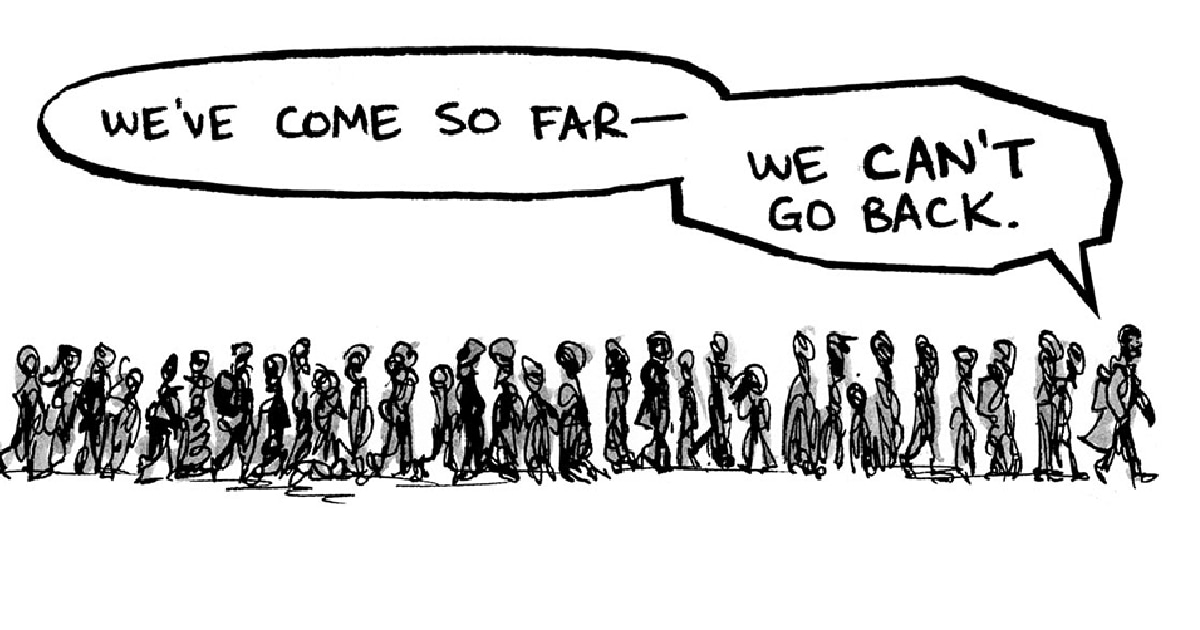Kids can handle learning about civil rights. So teach them.

Nate Powell and Andrew Aydin, with the late Rep. John Lewis, created the illustrated “March” trilogy about the history of the civil rights movement.
Not too long ago, a southern poverty law center report described what it called the “nine word problem” — that most u.s. high school graduates had learned only these few words about the civil rights movement:
Rosa parks,
Martin Luther King,
“I have a dream.”
With just those nine words, you can’t make a coherent picture of the civil rights movement- especially how change was actually achieved, who was involved in that change, and what ideas were central to it.
And that’s the entire point of limiting Americans’ understanding of the movement: it won’t make sense.
I believe there is a deliberate and systematic effort to exclude the civil rights movement from U.S. schools — and we cannot let that happen.
So we made the “march” trilogy to fix the “nine word problem.
It was my obligation to bear witness, to tell the story…
To teach young people the philosophy, and discipline of nonviolence.
To show young people (and people not-so-young), how another generation was able to stand up — to fight back.
In just a few years, “March” became one of the most widely taught graphic texts in America.
There are forces at work in America trying to take us back to another dark period —
And that is why we three created “March.”
It is my hope that it will be a guide, a roadmap, for a new generation to carry us forward.
Right now, there are dozens of laws working their way through legislatures in Texas, South Dakota, New Hampshire, and other states — as well as in local and statewide school boards in Florida, Virginia, and elsewhere — that would eliminate “March” (and historical accounts like it) from curricula and school libraries.
Several have already been signed into law.
How do new laws threaten these books? By labeling the often uncomfortable truths of our nation’s history as “divisive concepts” — especially history centering black people’s experiences — and by outlawing the teaching of historical perspectives outside of a patriotic feel-good framework of “progress”.
Last month, the Georgia house of representatives passed its own version —
In the same state John Lewis represented in congress for over 30 years and where “March” has been taught in public schools since 2016.
“Any curriculum, classroom instruction, or mandatory training program, whether delivered or facilitated by school personnel or a third party engaged by a school… shall not act upon, promote, or encourage divisive concepts”?!
We’ve come so far —
We can’t go back.
John lewis knew this day would come.
We spent years on the road, speaking about these books together because he believed so deeply that “March” was a way out —
A way to ensure every young person knew their power to shape the fabric of our society — the same power wielded through the civil rights movement.
Young people ask questions.
It’s what they do.
These pressure and intimidation campaigns are intended to ease the “discomfort” of white parents who wish to avoid answering these questions —
Mom, who’s John Lewis?
By avoiding having questions asked in the first place.
It has nothing to do with the discomfort of students.
Why were they protesting in selma?
Kids can handle it. They already do.
Now it’s up to us to speak up. In defense of young people’s capacity to learn true history, to handle a little
discomfort and to ask the important questions —
And why were the police beating them?
In more than just nine words.






